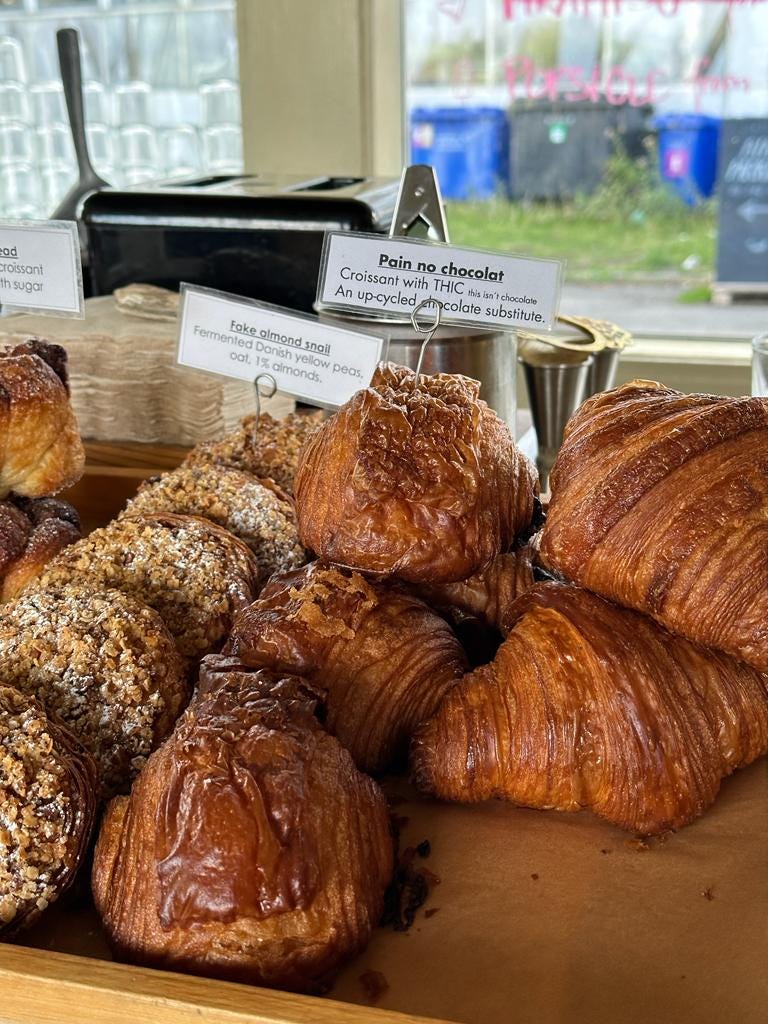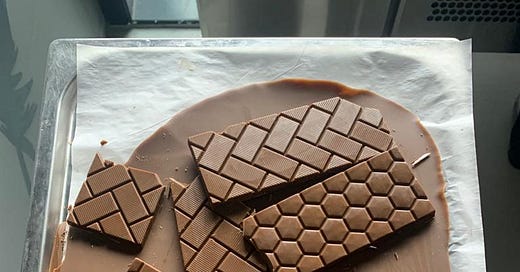One of the World’s Best Chefs Thinks "Upcycled" Is a Misguided Term
Matt Orlando of Endless Food Co. wants deliciousness to drive sustainable foods forward.
Welcome back to The Link, a bi-weekly circularity newsletter making the connection between regenerative farming and you, every other Tuesday.
I met Matt Orlando in 2016 while I was Editor in Chief of MUNCHIES. I was floored to find a like-minded climate optimist hiding out in plain sight, because sustainability was not exactly top of mind in food media back then. First, there was his legendary Chef’s Night Out, which underlined his laid back, San Diego, flip flop and hoodie wearing roots despite leading the charge on New Nordic cuisine at his legendary restaurant, Amass. Then we had a bizarre experience together as I chronicled the 72 hour Gelinaz shuffle, in which he swapped places with another chef, flew to New York, and cooked out of Mission Chinese right in the middle of the 2016 election. Our friendship has been built out of weird, gonzo experiences that have included drinking bootleg hooch in the anarchist Copenhagen neighborhood of Christiania, but our conversations always return to what circularity and climate innovation can look like in the food system if you let creativity and curiosity lead the way.
And if I haven’t spelled it out clearly enough yet, or perhaps you aren’t up on the world’s best chefs list, Matt Orlando is one of them. Literally. With a career that should be underlined by the word transformative, Matt has worked in some of the best kitchens in the US and Europe alike, from Aureole to Le Bernardin, The Fat Duck, and two different eras as sous chef and chef de cuisine at Noma before he opened his mind-bending, sustainable focused restaurant, Amass, in 2013.
It was the restaurant where Michelin-starred service and climate resilient eating were devoured every night. Orlando and his team found daily inspiration in discarded vegetable stems, leftover coffee grinds, day-old bread, and things that bubbled and fermented until created anew and served in a multi-course fine dining experience. Last fall, Orlando made the decision to close the doors to Amass and open Endless Food Co.. Along with his co-founders Christian Alexander Møller Bach and Maximillian Bogenmann, Matt continues to push the food industry forward by unlocking the flavor potential of overlooked and undervalued food resources. Their vision is simple: use deliciousness as the driver of innovation. I recently sat down with Matt to discuss what exactly Endless Food Co. is creating, why “upcycled” is a term that needs to be composted, where tech food companies go wrong, and what food products can look like in an innovative system.
So what exactly is going on over at Endless Food Co.?
Our goal is to establish some version of circularity in the food system that’s achieved by identifying what we are discarding or not giving value to and instead putting them through different processes to coax a whole other level of flavor out of them that we didn’t realize could exist. In doing that, we take these by-products or side streams and turn them into other products that arguably taste better than the original product itself and reintroduce them back into our food system. That’s the goal of Endless Food Co.—an endless loop.
THIC, a.k.a. “This Isn’t Chocolate,” (which, in my humble opinion, could use another C to underline its deliciousness) is Endless Food Co’s first product?
Yes! It all started back at Amass. People’s preconceived notions of what needs to be part of a meal when you go out to eat generally involves coffee and chocolate. Those have to make an appearance somewhere. At the time, we had a brewery where we were using spent beer grains through every process we could ever think of. Replacing chocolate at Amass was born out of the desire to not ship something from the other side of the planet because it was essentially the only thing aside from coffee that was coming from outside of Denmark into the restaurant.
Coffee is something that we never solved for at Amass, but chocolate was something that we thought about and asked ourselves: “OK let’s break chocolate apart and look at what factors stimulate people’s taste buds and how can we find something to put through a process that can replicate the experience of chocolate? So we went on this exploration with beer grains and were onto something. When we closed Amass and started Endless, chocolate was our number one priority. We’ve made about 200 different versions of it. It’s a bittersweet reality as a chef because you can always figure out something to tweak. Max, my co-founder, eventually looked at me and said, “This tastes really good, I think we should stop fucking with it.” Then we started talking with bakeries because we want this to be a B2B product so we partnered up with a bakery called Il Buco in Copenhagen and right now it’s the first product to sell out every day.

For anyone who hasn’t tasted it, how would you describe it?
It’s very chocolatey. The base product is made from grains, so it has a little bit of a malty taste. There’s some really good juice producers in Copenhagen that we source pressed fruit pulp from to emulate that fruitiness you get in some chocolates. We’ve found that as an ingredient for baking purposes, a really hard roast on it is great. All these factors lead you to this kind of bitter, fruity, dark chocolate with malty tones.
You know, people always talk about how screwed up the chocolate industry is, but what do you think we need to do for more people to realize that you don’t just have to make chocolate out of cacao, but other natural ingredients?
Awareness. From the people who produce food to consume it, people need to pull their heads out of the sand and make a little effort to understand the situation we are in on the planet in regards to our food system. We’re in a very dire situation and the general public chooses not to engage in that. Food is the only thing we have to do to survive every day other than drinking water, and it's something that no one talks about. There’s obviously a lot of people who don’t have food security on the planet, but just being aware of how valuable it is and the convenience and the methods we have to acquire food in abundance in Western industrial nations has put us on a course that is going to be extremely hard to turn around.
“Food has the ability to change people’s minds. It can be used as a tool to manipulate people… it’s also the most powerful form of communication.”
1000%. A large majority of us are removed from the inner cogs of the food system.
I’m reading a really good book right now called The Dorito Effect and the author touches on something important that is often discussed in the chef world: food has the ability to change people’s minds. This book also underlines how food can be used as a tool to manipulate people because the ability to make things that taste really good but are not good for you instead of things that are really good for you but don’t taste that great is the most powerful form of communication.
I think you hit the nail on the head right there. When I look at the “upcycled” CPG food category right now in North America, many of these products don’t really taste like they’ve been developed with flavor first even though they might have good intentions. Why do we have to use the term “upcycled” when we’re talking about food?
I understand that marketing needs catchphrases, but it's almost become a derogatory term. I think the idea of it is great in theory, but the way that people perceive it when you communicate it to them is not. There’s no regulatory body out there that can define what’s upcycled vs. not upcycled. If I take parsley stems and make a vinaigrette out of it, is that upcycled? I don’t know. Parsley stems are delicious to start with. The same goes for the term “sustainability.” There’s all these words that are being used now to describe this new “food movement” that are created as marketing terms to describe something. My hope in the future is that these terms get more clearly defined in how they’re being used so that they have more meaning to them that people can understand.
Do you think the “upcycled” label is a North American trend or are you seeing it in Europe, too?
It’s in Europe as well, but way less than in North America. There’s an upcycled foundation and an independent body. A friend of mine in the US is baking cookies with a certain percentage of upcycled flour and they’re able to label their product “upcycled” even though it's only 12% and the other 88% is raw ingredients. Don’t get me wrong; I think it’s headed in a very positive direction and I’m glad that this is part of the conversation because it wasn’t five years ago, but now we’re at a point where we can’t just be handing out certifications if you’re only using 12% of upcycled product and calling your whole product “upcycled.”
I think it’s a mindset shift, right? Rather than presenting a “parsley stem vinaigrette” as “upcycled,” calling it what it is (especially from a Michelin-starred chef like you) underlines the ingredients value in an inspiring, pleasure-forward way. With that approach, there is no such thing as waste, but endless innovation and creative expression. It reframes our notions of looking at something mundane, like a drop cloth splattered with paint into a masterpiece if, say, Jackson Pollack touches it. I think that the fact that we market them with a word that conjures recycled garbage speaks to the larger Western cultural issue you mentioned earlier: of disconnection from the food production system.
Well said. Even if we’re trying to give “upcycled” products value, the fact that we have to talk about them in a way separated solely from the original raw ingredients products is a problem.
So what else is Endless Food Co. working on?
It’s about using the skills that we have as chefs to try to push this narrative through the lens of deliciousness. You and I have talked about this before: using capitalism to our advantage to flip it on its head for good, and I couldn’t help but think about that as I was reading the last chapter in The Dorito Effect. The author was talking about flavor and exploiting people’s desires to have something that tastes really good over the fact that it’s really bad for you. What I would like to think we are doing at Endless Food Co. is the reverse: to show that you can eat delicious things that are really good for you and are also more responsible ways of consuming them. Endless Food Co. is using flavor in our favor. You can put that on a t-shirt if you want.
LOL. On an upcycled t-shirt.
Just write “fuck upcycling, use flavor ” on a shirt and print it. I think that flavor has to be the catalyst and then the label, whatever that is (not upcycled) can follow behind it.
Dare I say… tastemakers need to lead the way (sorry for the cringey pun). I firmly believe that systems change happens faster when culture beats strategy at its own game. Imagine if more chefs were brought into these food systems problems to transform what’s possible in the challenges ahead?
Agreed. That’s the problem with a lot of food tech startups these days. A lot of them have really good ideas but there’s no chefs working with them. They just hire scientists who have no concept about flavor. They might understand what compounds produce flavor, but they don’t actually know how to make flavor. The only thing that might stop us from serious climate change impacts over the next 100 years is innovating our way out of it. Unfortunately, most of the innovators in our food system right now are doing it for money. I’m not naive to the fact that we need to make money to do these projects, but as soon as you take on private equity money, there’s a pressure that overtakes any agenda based on doing any good for the planet instantly.
I’ve seen horrible products go to market because they couldn’t wait another month until they got the right ingredient to do it the right way. The investors are like “No! We need to go to the market right now!” These are not tech companies where two people are sitting in a basement coding. This is real shit that people are eating, and people are really opinionated about what food tastes like, so if you’re putting something out into the market and it doesn’t taste better than what you’re trying to replace, you don’t get a second chance. The whole investment strategy around food tech startups cannot be the same as traditional tech startups. There needs to be a whole new way to invest money into these food projects. A lot of them are really good but never get the chance to fully realize what it is they’re trying to do. Money makes people do really fucked up shit and makes them crazy. As soon as money is the motivating factor, we’re right back where we’re started.
Keep doing what you’re doing by literally serving it to people on a plate. Thanks for speaking with me!
Oh hey! You’re still reading this? If you have future topics, smart humans, or concepts you’d like to see featured, respond to this newsletter or drop me a line and say hey: Helen@HelenHollyman.com.
And if you liked this post from The Link, I dare you to share it!






You articulated what I could not... Well said, well written.